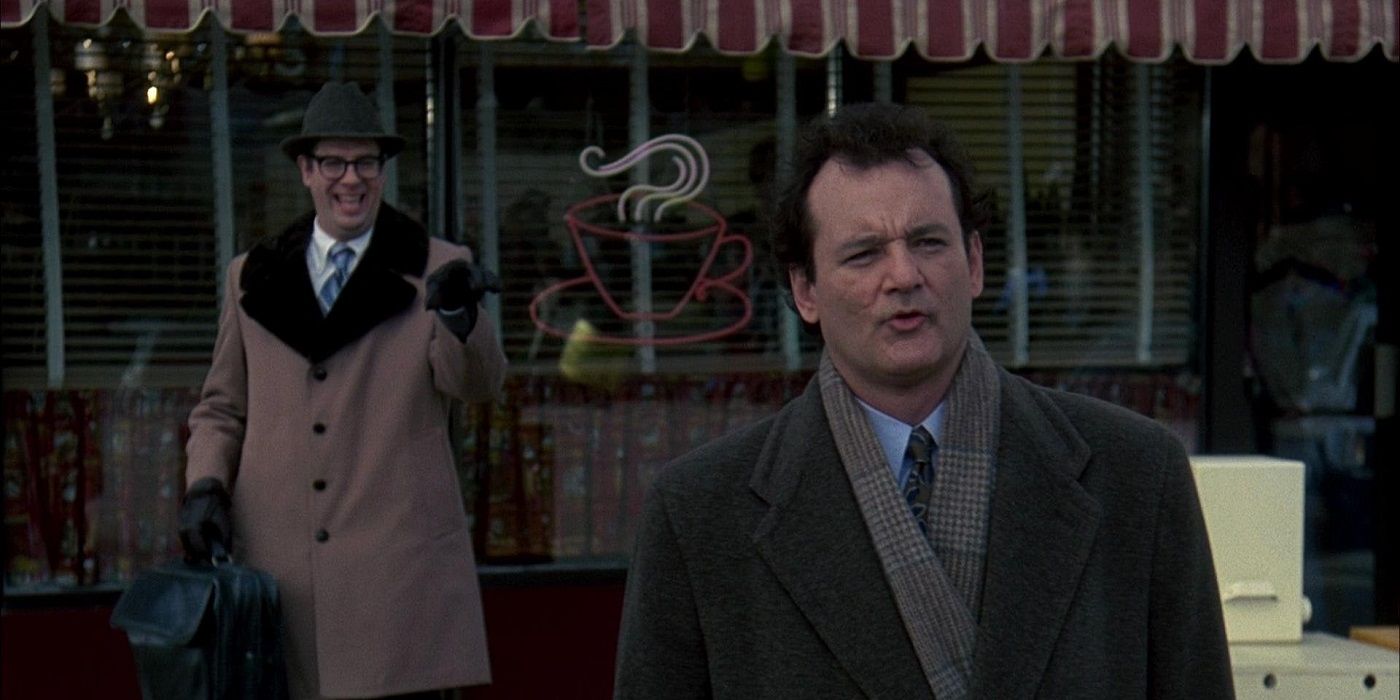The 1993 comedy Groundhog Day builds its central concept very carefully. It involves repeated jokes by design, and they need to work every time even though the audience knows exactly when they’re coming. Good actors help, and nowhere better than with Stephen Tobolowsky's Ned Ryerson, Phil Connor's (Bill Murray) obnoxious former acquaintance desperate to sell him insurance. Another dark figure dealing in contracts is the Devil, and if Phil's stay in Punxsutawney, PA, is purgatorial, it would only make sense to see the Devil trying to win him over.
Redditor SuperConductiveRabbi poses the theory that Ned Ryerson is the Devil, and he's holding Phil in a time loop in the hopes that he'll eventually give up and sell his soul. The idea is as eerily plausible as it is unsettling. No official explanation is ever given for why Phil starts reliving the same day over and over. The fact that he slowly reforms into a better man before finally escaping the time loop -- with the love of his life to boot -- speaks to the moral reform of a happy ending. But the theory renders all of that irrelevant. Instead, it's all about Ned, who -- like many an infernal figure before him -- is eager to make a deal.
Groundhog Day's Time Loop Begins With Ned Ryerson
According to the theory, the time loop begins the first time Phil runs into Ned and is intended to get him to sign a contract. They're supposedly friends from high school, but Phil doesn’t recognize him, thinking the man is a fan instead. Under the new theory, "Ned" was never his classmate. It's just the Devil ingratiating himself in the worst possible manner. Instead of asking about Phil's life or reminiscing about the good old days, Ned wants to sell him insurance. Phil tries to dismiss him, only to find the man clinging to him like a barnacle until he finally steps away, straight into a puddle of frozen slush. "Watch out for that first step, it's a doozy!" Ned cackles as Phil finally makes his ignominious escape.
The standard reading of the moment is simply that Ned is oblivious. He's trying to laugh off Phil's discomfort like old friends do, even though Phil clearly doesn't remember him and has no further interest in interacting. That becomes one of Groundhog Day's best running jokes as Ned pops up again and again at the same point in time, eager as a puppy and cheerfully shrugging off whatever new means Phil has devised of dismissing him. Under the new theory, however, that first step into the puddle becomes the moment the time loop starts.
Ned Ryerson as the Devil Darkens Groundhog Day's Moral Growth Theme
The logic becomes apparent at the end of Groundhog Day, where -- after countless centuries of living the same day over and over -- Phil finally "does everything right." He handles every problem the town has that day gracefully and elegantly while spreading encouragement and good cheer to everyone he meets. That includes signing a full array of insurance policies from Ned, as well as embracing him as a long-lost friend. Shortly thereafter, his nightmare ends: he awakens in his lover Rita's arms to freshly fallen snow on February 3, his life restored.
It's intended as a shorthand for Phil's shedding of material needs; money means nothing if he's going to wake the next day with all of it right back in his account, so why not use a chunk of it to make this man happy? But if Ned's the Devil, and he's been torturing him all this time, then Phil has signed over a good deal more than money. He's giving up his soul in exchange for escape. True to form, "Ned" gives it to him -- along with a happy life and a new lover just to sweeten the deal. Under this reading, Phil's redemption -- and all of his associated acts of kindness -- play no role in his escape. Only surrendering to Ned's relentless admonitions gets him free, and only temporarily, since selling his soul means that sooner or later, "Ned" will show up to collect.
It's quite bleak from a moral perspective, but it fits the events of Groundhog Day's narrative without contradiction. It would also be very much in keeping with Phil's early status as a self-serving jerk: exactly the kind of soul the Devil loves to claim. Ned himself holds deeply sinister underpinnings even without the theory -- his eagerness to make a sale borders on the sociopathic -- which the new reading simply makes overt. It's markedly different from the standard reading, but the way it fits so well into the narrative makes it all the more chilling.


